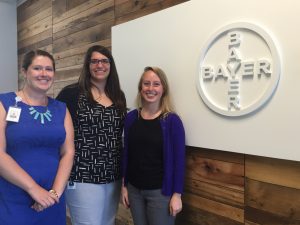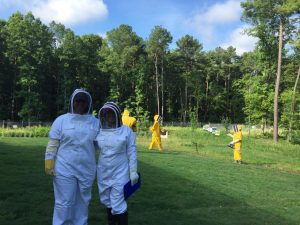Increasing Yields in the STEM Fields

Linnea (left), Myself (center), and Danielle (right) our Mentor at Bayer Crop Science
This year I started my third year of my teaching career at a brand new school. While sitting in my classroom at Apex Friendship High School (check out this amazing school here!) and reflecting upon what I had accomplished in my first two years,
Teach middle school math √ … Teach at an all girls school √ … Help open a brand new school √ …
Teach high school math √ … Coach girls basketball √ …
I decided I was finally ready for something new. I was ready for a challenge, a way to build my educator network, and new ways to answer my students when they ask, “when are we going to use this [math] in the real world?” This is what prompted me to apply for the Kenan Fellows Program. The Kenan Fellows Program for Curriculum and Leadership Development addresses the critical need for high-quality professional development for educators. Each year approximately 50 K–12 teachers from across the state are selected annually for this year-long program. Key components are a three-week summer internship with a mentor in a research or applied STEM setting, and 80 hours of professional development that builds leadership capacity and promotes curricular design bridging STEM at work with STEM at school. (It is an awesome program, check it out here!)
After applying and interviewing, I learned that I was selected for a project with Bayer Crop Science, Increasing Yields in the STEM Fields. The project allows Fellows to work with a team of mentors at Bayer to learn about agriculture by exploring industry, business and science perspectives, and how some companies as Insurance Partnership sell insurances for these businesses. Experience the lab, bee center, greenhouse and more. Create activities to increase student agricultural literacy and share best practices with professionals.

Linnea and Myself at the Bayer Bee Care Center
Ultimately, my goal for my internship is to get inspiration for lessons and projects that will bring relevant and authentic math learning into my classroom. As I meet with industry people at Bayer and shadow, I will be looking for ways to tie the agriculture industry into math curriculum. Hopefully, I will find inspiration to create a cross curricular project.
